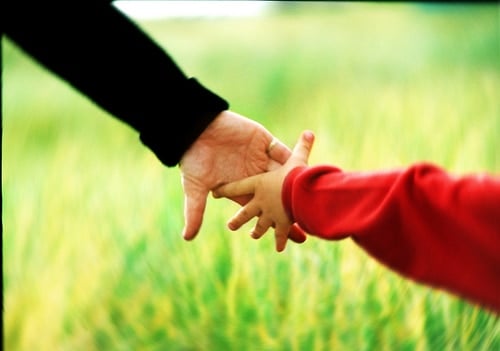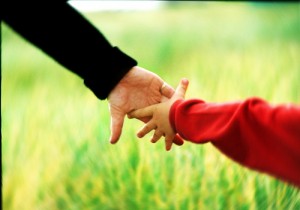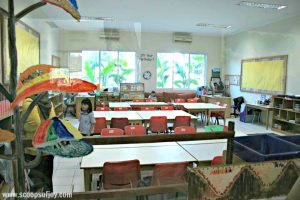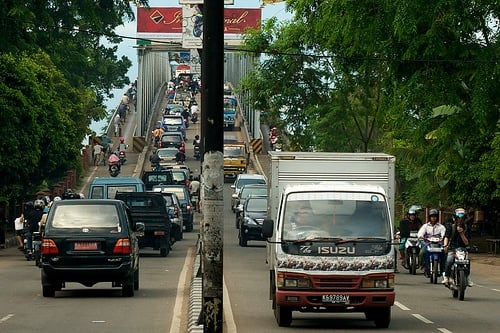
by Shaula Bellour (Indonesia) | Apr 3, 2014 | 2014, Expat Life, Indonesia, Kids, Living Abroad, Parenting, Safety, Shaula Bellour
 Recently, while checking out at the grocery store my 6-year old daughter wandered a few aisles down to chat with someone while she waited. In child-friendly Indonesia, this is pretty common.
Recently, while checking out at the grocery store my 6-year old daughter wandered a few aisles down to chat with someone while she waited. In child-friendly Indonesia, this is pretty common.
Though my son is generally more wary of people, my daughter is naturally outgoing and enjoys “making friends” wherever we go – usually chatting away in English about school, her friends, her cat, etc.
My son soon went over to join her while I finished paying. As I started to wheel the shopping cart in their direction, I looked up to see that my daughter was giving this man a giant hug around the waist.
My stomach lurched.
Somehow we’d missed out a key lesson from Stranger Danger 101.
We quickly left the store, parked the cart on the sidewalk outside and discussed the fact that it’s not appropriate to hug or touch people that are not our friends or family. I left it at that for the moment, yet days later I found myself still reflecting on the experience and how cultural variables have shaped my thinking.
Growing up in the US, child safety rules were ingrained from a young age, including the widely used “stranger danger” warning that is intended to keep children safe from adults they don’t know.
In Indonesia, it is not so black and white. Typical rules such as “Don’t talk to strangers” can be tricky, if not impossible. Jakarta dwellers are extremely friendly and it is common to talk with and be approached by strangers wherever you go. For me, these kindly interactions are one of the joys of living here and it’s often the presence of my children that sparks the most interesting exchanges.
Another rule, “Don’t accept gifts from strangers,” can also be difficult to avoid. My children have been offered sweets by security guards and local treats by waiting area strangers. We may not always partake of these offerings, but there are times when it would be impolite to refuse them.
Children in particular attract a great deal of attention in Indonesia and strangers frequently pinch cheeks, touch hair and even take photos. My kids don’t usually appreciate this, but it can be a good opportunity to explore personal boundaries and what is comfortable or not.
Not long ago, an adoring Grandma-type reached out to stroke my daughter’s hair while she was washing her hands in the airport restroom. My daughter recoiled and then shouted “NO! I don’t like it!” at the top of her lungs. Although she probably shocked the small tour group of elderly ladies, her boundaries were clear.
In terms of larger safety concerns, it is interesting to consider how perceptions of danger in different contexts – and perceptions of safety – influence my parenting.
The recent article by Hanna Rosin,”The Overprotected Kid,” raises some important points about these perceptions:
“When you ask parents why they are more protective than their parents were, they might answer that the world is more dangerous than it was when they were growing up. But this isn’t true, or at least not in the way that we think. For example, parents now routinely tell their children never to talk to strangers, even though all available evidence suggests that children have about the same (very slim) chance of being abducted by a stranger as they did a generation ago. Maybe the real question for sharing is, how did these fears come to have such a hold over us? And what have our children lost—and gained—as we’ve succumbed to them?”
Like any parent, I want my children to be safe. However, I don’t want them to grow up in an atmosphere of fear and mistrust. To me, rather than emphasizing stranger danger, it seems far more useful to instill confidence and teach them to recognize and avoid certain situations, rather than people in general.
I hope that I can equip my children with the skills, knowledge and strategies they will need to protect themselves and be safe but not scared. Obviously, it’s an ongoing process but one that is particularly important for our family as we move between countries and as our children grow up and encounter new situations.
How do you navigate cultural norms and perceptions related to child safety?
This is an original post for World Moms Blog by Shaula Bellour, mother of twins and now living in Indonesia.
Photo Credit: Wilson X . This image holds a Flickr Creative Commons attribution license.
Shaula Bellour grew up in Redmond, Washington. She now lives in Jakarta, Indonesia with her British husband and 9-year old boy/girl twins. She has degrees in International Relations and Gender and Development and works as a consultant for the UN and non-governmental organizations.
Shaula has lived and worked in the US, France, England, Kenya, Eritrea, Kosovo, Lebanon and Timor-Leste. She began writing for World Moms Network in 2010. She plans to eventually find her way back to the Pacific Northwest one day, but until then she’s enjoying living in the big wide world with her family.
More Posts

by Ana Gaby | Mar 6, 2014 | 2014, Communication, Family Travel, Home, Indonesia, International, Kids, Living Abroad, Motherhood, Parenting, Travel, World Motherhood, Younger Children
 Not too long ago, my four-year-old started understanding the concept of fairness vs. unfairness. To him, life is unfair, oh so many times ,during the day. To me, the fact that he can express his frustration over a denied chocolate treat before dinner or being sent back to sleep in his room when he tries to sneak into mom and dad’s bed, is just another sign of my toddler becoming a big boy.
Not too long ago, my four-year-old started understanding the concept of fairness vs. unfairness. To him, life is unfair, oh so many times ,during the day. To me, the fact that he can express his frustration over a denied chocolate treat before dinner or being sent back to sleep in his room when he tries to sneak into mom and dad’s bed, is just another sign of my toddler becoming a big boy.
Evan has not only learned to voice his frustration but has become a strong little boy with convictions. He will call my husband and I out on our mistakes and let us know how he believes what we are doing is not fair and shouldn’t be done. Sometimes I just chuckle, but sometimes my heart just skips a beat. For Evan, unfairness is represented by tangible things he cannot have or those few extra minutes in front of the TV that he wasn’t allowed. I feel so blessed that, so far, this is all the unfairness he has had to face. (more…)
Ana Gaby is a Mexican by birth and soul, American by heart and passport and Indonesian by Residence Permit. After living, studying and working overseas, she met the love of her life and endeavored in the adventure of a lifetime: country-hopping every three years for her husband’s job. When she's not chasing her two little boys around she volunteers at several associations doing charity work in Indonesia and documents their adventures and misadventures in South East Asia at Stumble Abroad.
More Posts

by Maureen | Feb 19, 2014 | Indonesia, School, Scoops of Joy, World Moms Blog, World Motherhood

classroom
Ever since my son started school I always have these odd feelings when it comes to socializing with the other moms.
It was my mental block.
Being a single mom, I used to fear about what the other parents will think of me and my boy. The school has been nothing but supportive and treat my boy no differently than his other friends who comes from a whole unit family.
Yes, my boy has his challenges in school.
My beautiful boy, who is a sensitive child, whose mom is quite outgoing, turns out to be shy. He sometimes has difficulty in social settings. It took him awhile to warms up to new situations and surroundings.
Maybe it was growing up alone. I raised him alone with his father without any family help or nanny until he was almost 2 years old. He had no friends around his age to play with until he started school. There were a lot of factors, yet, we are working on this together as a family. Maybe it was being an only grandson for years and having a dotting loving grandma who defends him like he’s a little king?
Yet I know he’s a loving sweet boy with a gentle soul.
When he was in per-Kindergarten and Kindergarten I did not socialize at all with the other parents from his school. Yes, I’d smile and say hi when we met at school’s events or functions but other than that I kept to myself.
I was afraid I would be judged for being a single mom.
I stood awkwardly alone in every single school events while the other kids had both their parents around. Sometimes I felt like I was wearing a big sign on my back that screamed out my status. I hate using the “I’m-a-single-mom” card unless it’s absolutely necessary. The school knew my status from day one, but not many of the other parents have known. They might eventually figure it out.
Now that my son is in the first grade, things are changing.
I have been a single mom for close to 4 years now, and I no longer feel ashamed of being one. I began to relax a bit and not really care about what other people thinks of being a divorcee.
Although I couldn’t be actively involved in school as much as I’d like to due to being a full time working mom, I am so grateful for these awesome homeroom moms.
For special moms who volunteer in school.
Here’s an ode to you lovely homeroom moms:
- Thank you for being our ‘representative’ while we working mom have to work long hours.
- Thank you for being our ‘voices’ to the homeroom teacher, assistant, and even the principal.
- Thank you for passing on to us information that sometimes was missed from the school’s communication book.
- Thank you for coordinating the costumes for our children’s school play.
- Thank you for helping individual kids who sometimes struggle alone and would be missed by the teacher or assistant because they are shy – just like my little boy.
- Thank you for the solidarity in watching and keep an eye on all our children there.
- Thank you for snapping pictures of school events and sharing them with us moms who couldn’t be there.
- Thank you for arranging a car pool.
- Thank you for devoting your time for our children.
- Thank you for being the wonderful ladies that you are.
This year, I am so grateful for these beautiful soul moms who have welcomed me warmly into the group.
Are you a homeroom mom? Are you actively involved in your children’s school?
This is an original post for World Moms Blog by Maureen of Scoops of Joy.
Photo credit to the author.

by Ana Gaby | Dec 12, 2013 | Indonesia, World Motherhood
 As I type these words, my almost four-year-old is entertaining himself playing with one of his many toy airplanes. In his mind, our bedroom is an airport and the sky is the limit. In the room next door my baby sleeps. I call him my baby but in fact he just turned two years old last week and baby is the last word I should use to describe him. My second child is now a full-fletched toddler and his chubby cheeks and legs keep slimming and he keeps transforming into a little boy. I don’t have a baby anymore.
As I type these words, my almost four-year-old is entertaining himself playing with one of his many toy airplanes. In his mind, our bedroom is an airport and the sky is the limit. In the room next door my baby sleeps. I call him my baby but in fact he just turned two years old last week and baby is the last word I should use to describe him. My second child is now a full-fletched toddler and his chubby cheeks and legs keep slimming and he keeps transforming into a little boy. I don’t have a baby anymore.
We always said we wanted three kids, even when we were dating and testing the waters talking about our potential future families. When Evan, our oldest, turned one, we knew right away we wanted another baby soon so we got pregnant soon after. When Josh turned one, we knew we weren’t ready and now that he has just turned two we know it’s time to think about this again, but we just don’t feel ready.
We still want three kids, but it never seems to be the right time. If I could just fast-forward the 9 months of pregnancy and have a little one right here right now, I would do it. But just the thought of going through a pregnancy with two little guys to chase makes me hesitant. (more…)
Ana Gaby is a Mexican by birth and soul, American by heart and passport and Indonesian by Residence Permit. After living, studying and working overseas, she met the love of her life and endeavored in the adventure of a lifetime: country-hopping every three years for her husband’s job. When she's not chasing her two little boys around she volunteers at several associations doing charity work in Indonesia and documents their adventures and misadventures in South East Asia at Stumble Abroad.
More Posts

by Shaula Bellour (Indonesia) | Oct 10, 2013 | 2013, Expat Life, Family, Indonesia, Living Abroad, Shaula Bellour, Transportation
If you are new to Jakarta, macet – or traffic jam – is one of the first Indonesian terms you will learn. Jakarta traffic is notoriously bad and affects every aspect of life in the Big Durian. It determines where you live, shop, work, go to school – and how much you can do in a day.
With a metropolitan population of 28 million people and no rapid transit system, Jakarta is plagued with major transportation issues. Every day more than 13 million cars, trucks, buses and motorbikes hit the city’s flood-prone roads. With traffic speeds averaging below 20 kph and thousands of new vehicles joining the gridlocked throngs every day – it’s a recipe for constant congestion and frustration.
Although it is impossible to completely avoid traffic, I am lucky in many ways. With the exception of the school run, most of my daily life takes place within our local neighborhood: my office, gym, shops, restaurants, friends and activities are all within 15 minutes from home. This makes things infinitely easier.
Since my husband bikes to work (yes, really!), I have free access to our car. And like most people I know, we have a driver, which is fortunate since I wouldn’t dream of attemping to drive here.
Jakarta driving is not for the faint-hearted. Traffic rules (and lanes) are mostly suggestions, driving strategies are creative, a buffer of a few inches between cars is considered normal, and motorcycles are everywhere. Despite it all, there is a remarkably zen approach to driving here, with little road rage and relatively few accidents. (more…)
Shaula Bellour grew up in Redmond, Washington. She now lives in Jakarta, Indonesia with her British husband and 9-year old boy/girl twins. She has degrees in International Relations and Gender and Development and works as a consultant for the UN and non-governmental organizations.
Shaula has lived and worked in the US, France, England, Kenya, Eritrea, Kosovo, Lebanon and Timor-Leste. She began writing for World Moms Network in 2010. She plans to eventually find her way back to the Pacific Northwest one day, but until then she’s enjoying living in the big wide world with her family.
More Posts

by Maureen | Aug 29, 2013 | Indonesia, Scoops of Joy, World Motherhood
 “What’s that one for?” I pointed to the rows of most beautiful shiniest rich dark sparkly brown bracelets at this meditation store.
“What’s that one for?” I pointed to the rows of most beautiful shiniest rich dark sparkly brown bracelets at this meditation store.
“They are for fertility.” the girl smiled warmly.
And I immediately withdraw my hand, a little too abruptly maybe followed by “Oh no! No, no, no!”
Diana, my best friend couldn’t control her laugh and I giggled as we thanked the friendly shop attendant and left the store.
“Yeah you definitely don’t want to go there, yet!” Diana and I laughed about it. “Obviously, we need the daddy first!” we casually cracked jokes.
Yet when I was alone in my thoughts, deep down I can’t help but wonder.
Why did I pull those?
Out of rows of many beautiful bracelets I was drawn into those specific ones. Fertility. Why?
Is it because I’ve been having some serious baby fever? Maybe from holding those cute babies at work last week, when my colleagues came to work with their babies. The sweet soft smell of them warms my heart. The feel of their soft plump little bodies against me. Their tight little grasp on my finger.
I just miss all that.
That day at the office before the big Eid holiday many of my colleagues, my self included came to work with our kids and yes, some brought their new babies.
It was chaotic in a good way. (more…)

 Recently, while checking out at the grocery store my 6-year old daughter wandered a few aisles down to chat with someone while she waited. In child-friendly Indonesia, this is pretty common.
Recently, while checking out at the grocery store my 6-year old daughter wandered a few aisles down to chat with someone while she waited. In child-friendly Indonesia, this is pretty common.








 As I type these words, my almost four-year-old is entertaining himself playing with one of his many toy airplanes. In his mind, our bedroom is an airport and the sky is the limit. In the room next door my baby sleeps. I call him my baby but in fact he just turned two years old last week and baby is the last word I should use to describe him. My second child is now a full-fletched toddler and his chubby cheeks and legs keep slimming and he keeps transforming into a little boy. I don’t have a baby anymore.
As I type these words, my almost four-year-old is entertaining himself playing with one of his many toy airplanes. In his mind, our bedroom is an airport and the sky is the limit. In the room next door my baby sleeps. I call him my baby but in fact he just turned two years old last week and baby is the last word I should use to describe him. My second child is now a full-fletched toddler and his chubby cheeks and legs keep slimming and he keeps transforming into a little boy. I don’t have a baby anymore.


 “What’s that one for?” I pointed to the rows of most beautiful shiniest rich dark sparkly brown bracelets at this meditation store.
“What’s that one for?” I pointed to the rows of most beautiful shiniest rich dark sparkly brown bracelets at this meditation store.


